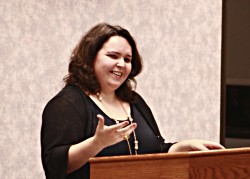 |
| Kathryn Jean Lopez |
Was Jesus a card-carrying member of the ACLU? Did he donate to the National Right to Life Committee? I don’t believe we’ve seen it in the tax returns.
But by bothering with us – by walking among men and giving us a model for life in this world, by having mercy on sinners he chose to be the early Church leaders – true cultural trailblazers – he made clear that political activism here is worthy of our time and effort. If it’s worth him living and dying and rising among us, it’s clearly worth our prayerful lives of engagement.
Not only does the reality and testimony to his presence among us as a man remind us that this place is important on our way home, that he is Truth itself should be the ultimate roadmap to the political activists.
As Christians, our involvement in politics is only as good as our faithfulness. We are politically active because of our love of God and man – of our brothers and sisters in Christ.
In a January address to the Holy See diplomatic corps, the author of Jesus of Nazareth: Holy Week said:
“I invite everyone to acknowledge the great lesson of history: ‘How can anyone deny the contribution of the world’s great religions to the development of civilization? The sincere search for God has led to greater respect for human dignity. Christian communities, with their patrimony of values and principles, have contributed much to making individuals and peoples aware of their identity and their dignity, the establishment of democratic institutions and the recognition of human rights and their corresponding duties. Today too, in an increasingly globalized society, Christians are called, not only through their responsible involvement in civic, economic and political life but also through the witness of their charity and faith, to offer a valuable contribution to the laborious and stimulating pursuit of justice, integral human development and the right ordering of human affairs’ (Message for the Celebration of World Peace Day, 1 January 2011, 7).”
Those words were delivered in a context of encouraging religious freedom and cautioning and admonishing against blasphemy laws and other threats to the practice of faith, and thus the very dignity of man. This contemporary battle recently took the life of a fellow Catholic, Shahbaz Bhatti in Pakistan.
On the Cross, Christ gives the activist great comfort.
“Father, forgive them.”
“I know that you acted in ignorance, as did also your rulers.”
Men in community – even ones who purport to be Christian – will ignorantly participate with evil acts, believing they’re doing something else. This can be a source of great distress, individually, and as good men and women in community seeking the good.
His grace will lead us home. Let us pray. For us and our fellow activists – even the ones we disagree with.
In that address to the diplomatic corps earlier this year, the Holy Father also said:
“‘God alone responds to the yearning present in the heart of every man and woman’ (Post-Synodal Apostolic Exhortation Verbum Domini, 23). Humanity throughout history, in its beliefs and rituals, demonstrates a constant search for God and ‘these forms of religious expression are so universal that one may well call man a religious being’ (Catechism of the Catholic Church, 28). The religious dimension is an undeniable and irrepressible feature of man’s being and acting, the measure of the fulfillment of his destiny and of the building up of the community to which he belongs. Consequently, when the individual himself or those around him neglect or deny this fundamental dimension, imbalances and conflicts arise at all levels, both personal and interpersonal.”
And in Jesus of Nazareth: Holy Week, Pope Benedict XVI writes:
“Because he is God, he sees with total clarity the whole foul flood of evil, all the power of lies and pride, all the wiles and cruelty of the evil that masks itself as life yet constantly serves to destroy, debase, and crush life. Because he is the Son, he experiences deeply all the horror, filth, and baseness that he must drink from the ‘chalice’ prepared for him: the vast power of sin and death. All this he must take into himself, so that it can be disarmed and defeated in him.”
Power doesn’t have to corrupt. Because the power of the Cross is more powerful than any lies and pride and cruelty. That’s not a bad message for political activists. Be always united to God, who loved us enough to send His Son to confirm this is all worthy and doable. Your leadership is only as good as your surrender to the service of He who is Hope.
Christ was the model, the Holy Trinity provides the winning coalition, and life in the Divine Presence is destination of political activists. We pray for prudence and humility. We pray to be more like Christ, even in the backrooms of Washington. Political activism, for the Christian, requires apostolic courage.
And so … we pray.
Kathryn Jean Lopez is editor-at-large of National Review Online.

Great job, Kathryn!
ReplyDelete